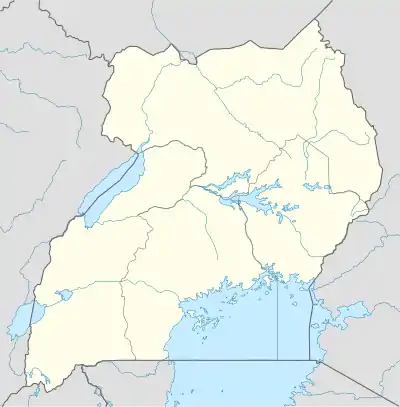Kyangwali Refugee Settlement
Kyangwali Refugee Settlement is a refugee camp in the Kibuube District (formerly Hoima District) in western Uganda.[2] As of 2021, Kyangwali is home to 125,039 people.
Kyangwali Refugee Settlement | |
|---|---|
 Kyangwali Refugee Settlement | |
| Coordinates: 1.22°N 30.82°E | |
| Country | Uganda |
| District | Kikuube |
| Population (2021)[1] | |
| • Total | 125,039 |
Background
Refugees from Rwanda started to live in Kyangwali when the settlement was opened in the 1960s. From the 1990s to 2010s, refugees from the Democratic Republic of the Congo and the Republic of the Congo lived in Kyangwali. More than 38,000 people lived in Kyangwali in 2015.[2][3]
In 2018, the number of residents had risen to 83,558.[4] As of January 2021 the population of the settlement had reached 125,039, in 42,428 separate households. Of these, 81 per cent are women and children and 19 per cent are youth aged between 15–24 years.[1]
Social Services
Kyangwali Refugee Settlement has more than 30 relief agencies trying to support refugees. These function as either an 'implementing partner', or an 'operating partner' with the UNHCR. Reportedly, a widespread perception among the more educated refugees is that the agencies promise donors more than they actually deliver. This has led to the formation of more than twenty community-based organisations (CBOs). Although the majority of these refugee-founded agencies rely on their own community resources, and the support of the refugee population itself to help the most vulnerable among them,[5][6] some of the CBOs, such as CIYOTA[7] (the COBURWAS International Youth Organization to Transform Africa[lower-alpha 1]), the Planning for Tomorrow Youth Organisation (P4T),[8][9] and Ray of Hope Africa (RAHA),[10] have gone further, and gained national and international recognition from the UNHCR, the World Bank, and other agencies and donors.
The Kyangwali Star provides news to people living in Kyangwali.[11]
Notes
- COBURWAS stands for Congo (DRC), Burundi, Uganda, Rwanda and Sudan
References
- UNHCR. "Uganda - Refugee Statistics January 2021 - Kyangwali - Uganda". ReliefWeb.
- "Uganda - Hoima - Kyangwali". DRC Regional Refugee Response Information Sharing Portal. UNHCR. Archived from the original on 5 August 2016. Retrieved 7 June 2016.
- "The Case of Kyangawali Refugee Settlement and the Locals – Ticking time bomb? – Centre for Policy Analysis". Retrieved 2020-09-26.
- UNHCR. "Uganda Refugee Response Monitoring Settlement Fact Sheet: Kyangwali - March 2018". UNHCR Operational Data Portal (ODP). Retrieved 3 November 2021.
- "History and Development". www.coburwas.org. Retrieved 2019-09-08.
- "Planning For Tomorrow Youth Organisation: Corporate NGO partnerships". www.globalhand.org. Retrieved 2019-09-08.
- CIYOTA. "CIYOTA - Educating refugees and conflict-affected youth across East Africa". COBURWAS. Retrieved 3 November 2021. CIYOTA index
- P4T
- P4T. "Planning For Tomorrow Youth Organisation". planningfortomorrow.org. Retrieved 3 November 2021.
- RAHA Africa Co. Ltd: RAA-U page
- "Government services in Musaffah". www.govserv.org. Retrieved 2020-09-25.
External links
- Crossroads Global Hand. "Planning For Tomorrow Youth Organisation: Corporate NGO partnerships". www.globalhand.org. Retrieved 3 November 2021.
- Kopernik. "Ray of Hope Africa - Implementation Partner". kopernik.info. Retrieved 3 November 2021.